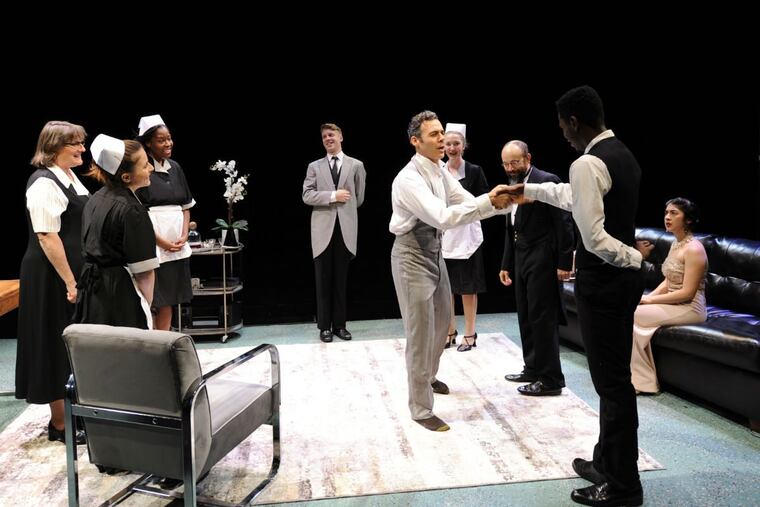'My Fair Lady' at Quintessence: Brio, music, and a closing truth for our moment
"My Fair Lady," through Dec. 23 at the Quintessence Theatre Group, is, I'm told, the group's first attempt at an adult classic musical. It's a success (Friday's house was packed with a singalong crowd), and I hope they do a lot more. It's an evening full of brio, heady emotions, the spectacle of people changing before your eyes, and a profound closing truth, all the more profound right now.

My Fair Lady, through Dec. 23 at the Quintessence Theatre Group, is, I'm told, the group's first attempt at a classic adult musical. It's a success (Friday's house was packed with a singalong crowd), an evening full of heady emotion, the spectacle of people changing before your eyes, and a profound closing truth, all the more profound right now.
My Fair Lady gets the Quintessence treatment: intimate, stripped down, concentrating on character, language, and action. The audience sits on either side of a runway, with a piano at each end; despite abundant flubs, the pianists were at their best during the songs. Effective costumes, but no florid Edwardian sets: a couple of potted evergreens tell us we're at the ball, and a couch and desk signify Henry Higgins' office. With elegant, simple choreography by Kaki Burns, the ensemble (Rakeem Lawrence, Maya Lerman, and Jordan Dobson were especially delightful) dances right in front of us, driving home scene and character.
It's also an ethnically diverse production, although even with a lily-white cast, My Fair Lady takes aim in its own way at division. Henry (suave, beautiful-voiced Gregory Isaac, a Rex Harrison with even more grace, wit, and cluelessness) believes dialect is the key to class division, and he and his pal Col. Pickering (the play's conscience and chorus, expertly done by Doug Hara) see their experiment as a poke in its eye.
Hurray for Leigha Kato, this production's Eliza; she's terrific. On her website, Kato tells of her Japanese/Spanish/Mexican roots. I'm not going to tell you she gets the accents exactly right, but Kato handles the difficult vocals well and makes her own Eliza, a fighter from the start who wins over the audience instantly. The changes in Eliza emerge through a series of costumes, and Kato seems to inhabit each stage, taking on change (correct pronunciation, expanded dreams) while retaining her sense of self (determination, awareness, willing to proceed but nobody's puppet).
Disgraceful and lovable at once, mountainous Bradley Mott plays Alfred Doolittle, a dustman who, with his mates, wears the reflective safety vest of the public servant. And Lee Cortopassi as Freddy got the night's biggest blast of applause for "The Street Where You Live."
Director Alexander Burns, who deserves congratulations, points out that when the company planned this show, they had no idea of the cultural paroxysm we'd be in right now, when a congressman recently tweeted that diversity leads to a "lower quality of life." There is a submerged violence, a potential for abuse, in Henry. He jokes constantly of roughing up Eliza, and once almost raises his hand. Pickering sees that potential, but Henry doesn't until the end.
He has seen Eliza as a thing, not a person, until too late; even his mother, for this reason, is on Eliza's side. Kato is splendidly sure in the greatest kiss-off tune in American theater, "Without You." The closing handshake between teacher and student recognizes her and the future she can make on her own. This is a great holiday season to be doing My Fair Lady – and a great time to be seeing it.